- Latest Version 1.128
- Version 1.126
- SAPUI Version 1.124
- SAPUI5 Version 1.122
- SAPUI5 Version 1.120
- SAPUI5 Version 1.118
- SAPUI5 Version 1.116
- SAPUI5 Version 1.114
- SAPUI5 Version 1.112
- SAPUI5 Version 1.110
- SAPUI5 Version 1.108
- SAPUI5 Version 1.106
- SAPUI5 Version 1.104
- SAPUI5 Version 1.102
- SAPUI5 Version 1.100
- SAPUI5 Version 1.98
- SAPUI5 Version 1.96
- SAPUI5 Version 1.94
- SAPUI5 Version 1.92
- SAPUI5 Version 1.90
- SAPUI5 Version 1.88
- SAPUI5 Version 1.86
- SAPUI5 Version 1.84
- SAPUI5 Version 1.82
- SAPUI5 Version 1.80
- SAPUI5 Version 1.78
- SAPUI5 Version 1.76
- SAPUI5 Version 1.74
- SAPUI5 Version 1.72
- SAPUI5 Version 1.70
- SAPUI5 Version 1.68
- SAPUI5 Version 1.66
- SAPUI5 Version 1.64
- SAPUI5 Version 1.62
- SAPUI5 Version 1.60
- SAPUI5 Version 1.58
- SAPUI5 Version 1.56
- SAPUI5 Version 1.54
- SAPUI5 Version 1.52
- SAPUI5 Version 1.50
- SAPUI5 Version 1.48
- SAPUI5 Version 1.46
- SAPUI5 Version 1.44
- SAPUI5 Version 1.40
- SAPUI5 Version 1.38
- SAPUI5 Version 1.36
- SAPUI5 Version 1.34
- SAPUI5 Version 1.32
- SAPUI5 Version 1.30
- SAPUI5 Version 1.28
- SAPUI5 Version 1.26
- Latest Version 1.128
- Version 1.126
- SAPUI Version 1.124
- SAPUI5 Version 1.122
- SAPUI5 Version 1.120
- SAPUI5 Version 1.118
- SAPUI5 Version 1.116
- SAPUI5 Version 1.114
- SAPUI5 Version 1.112
- SAPUI5 Version 1.110
- SAPUI5 Version 1.108
- SAPUI5 Version 1.106
- SAPUI5 Version 1.104
- SAPUI5 Version 1.102
- SAPUI5 Version 1.100
- SAPUI5 Version 1.98
- SAPUI5 Version 1.96
- SAPUI5 Version 1.94
- SAPUI5 Version 1.92
- SAPUI5 Version 1.90
- SAPUI5 Version 1.88
- SAPUI5 Version 1.86
- SAPUI5 Version 1.84
- SAPUI5 Version 1.82
- SAPUI5 Version 1.80
- SAPUI5 Version 1.78
- SAPUI5 Version 1.76
- SAPUI5 Version 1.74
- SAPUI5 Version 1.72
- SAPUI5 Version 1.70
- SAPUI5 Version 1.68
- SAPUI5 Version 1.66
- SAPUI5 Version 1.64
- SAPUI5 Version 1.62
- SAPUI5 Version 1.60
- SAPUI5 Version 1.58
- SAPUI5 Version 1.56
- SAPUI5 Version 1.54
- SAPUI5 Version 1.52
- SAPUI5 Version 1.50
- SAPUI5 Version 1.48
- SAPUI5 Version 1.46
- SAPUI5 Version 1.44
- SAPUI5 Version 1.42
- SAPUI5 Version 1.40
- SAPUI5 Version 1.38
- SAPUI5 Version 1.36
- SAPUI5 Version 1.34
- SAPUI5 Version 1.32
- SAPUI5 Version 1.30
- SAPUI5 Version 1.28
- SAPUI5 Version 1.26
Table Personalization Dialog
sap.m.TablePersoDialog
Intro
The table personalization dialog allows you to display and modify table settings. It is a UI pattern that defines column order and visibility.
Usage
Use the table personalization dialog if:
- You have small tables.
- You have a manageable number of columns.
Do not use the table personalization dialog if:
- You have large tables.
- You have a lot of columns to manage.
For larger tables you can use the P13n dialog (sap.m.P13nDialog) instead.
Responsiveness
On a desktop and tablet, the control appears as a dialog window.
The table personalization dialog should always be displayed in full screen mode on a smartphone device.
Layout
Position on the Screen
The dialog always opens in a modal window in the center of the screen.
For smartphones, stretch the dialog to fill the entire screen. For tablet and desktop devices, keep the modal window.
Layout of the Dialog
The table personalization dialog comprises the following five areas:
Components
The table personalization dialog contains the following sections:
Toolbar
The toolbar displays the Move Column Up and Move Column Down buttons and the Search field.
Column list
The column list displays the result list of columns. The user can use the search field in the toolbar to filter the selection.
Footer toolbar
The footer toolbar displays an OK and a Cancel button.
Behavior and Interaction
The user can show or hide all columns with just one click. A checkbox on the left-hand side of the subtoolbar enables all list items to be selected or deselected.
(1) Columns are visible in the table.
(2) Columns are hidden in the table.
Move Columns
Two buttons in the toolbar on the left-hand side enable a selected column to be moved up or down.
Move Column Up
(1) Select a column (by clicking on the list item).
(2) Use the Move Column Up button to move the column to the left in the table.
- If the first position has been reached, the Move Column Up button is disabled.
Move Column Down
(1) Select a column (by clicking on the list item).
(2) Use the Move Column Down button to move the column to the right in the table.
- If the last position has been reached, the Move Column Down button is disabled.
Search/Filter Columns
A search field in the toolbar on the right-hand side enables columns to be searched/filtered.
The user can type any character into the search field to filter the columns to match the input.
To reset a search, the user must delete all the characters that have been entered, or simply presses the Cancel button in the search field.
All the columns are shown again in the list.
Undo Personalization
The Undo Personalization button in the subtoolbar on the right-hand side resets all settings to the initial state.
If the table personalization dialog is used together with variant management, the button resets the changes to the initial state of the selected variant.
Guidelines
Search Behavior
The search is a live search (also known as “search-as-you-type”), which is triggered by each character the user enters or deletes. For more information, see search.
Resources
Want to dive deeper? Follow the links below to find out more about related controls, the SAPUI5 implementation, and the visual design.
Elements and Controls
- Toolbar (guidelines)
- Button (guidelines)
- Search (guidelines)
- List (guidelines)
- Footer Toolbar (guidelines)
Implementation
- Table Personalization Dialog (SAPUI5 samples)
- Table Personalization Controller (SAPUI5 samples)
- Table Personalization Dialog (SAPUI5 API reference)
- Table Personalization Controller (SAPUI5 API reference)

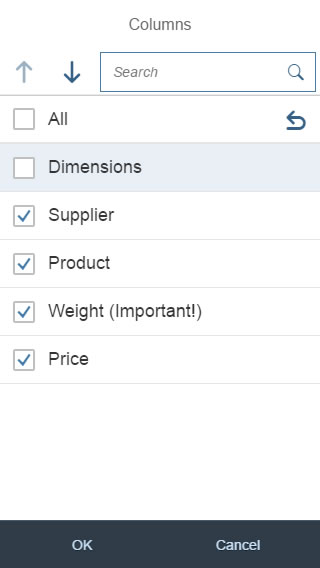
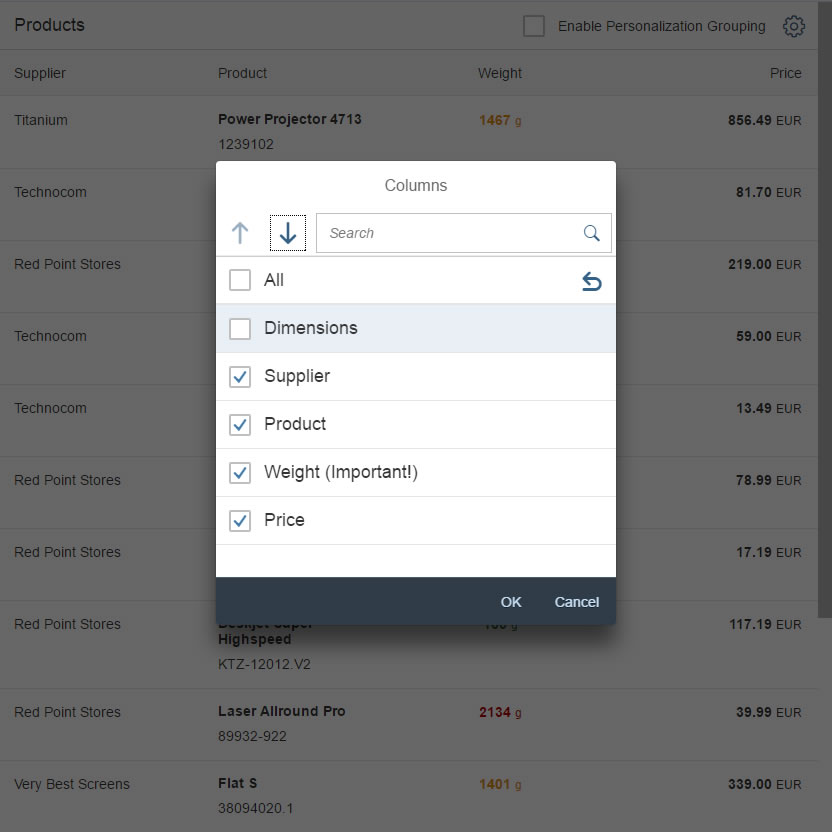
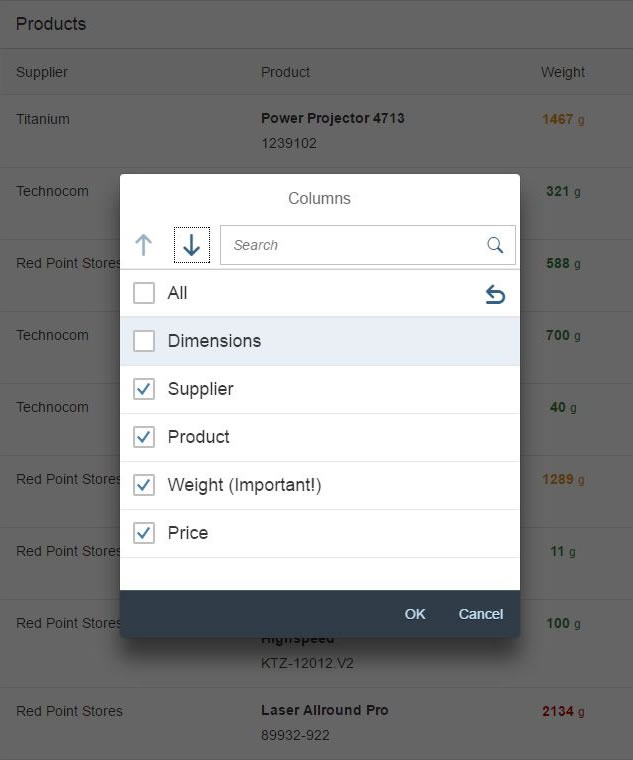
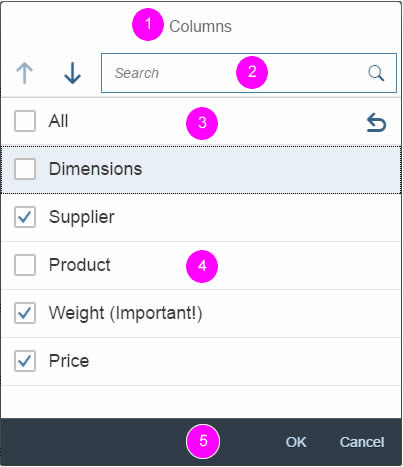



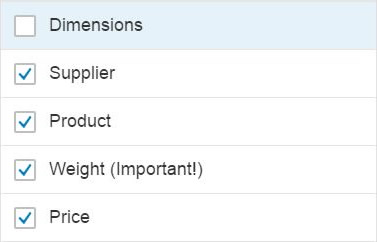

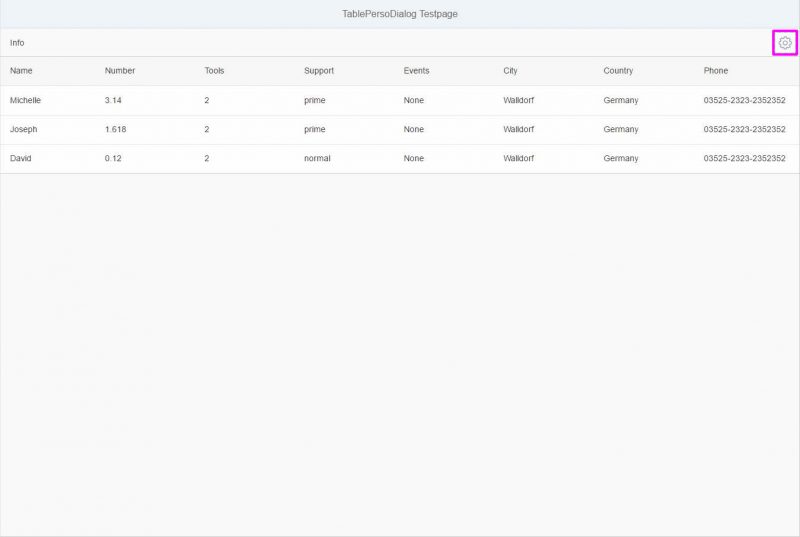
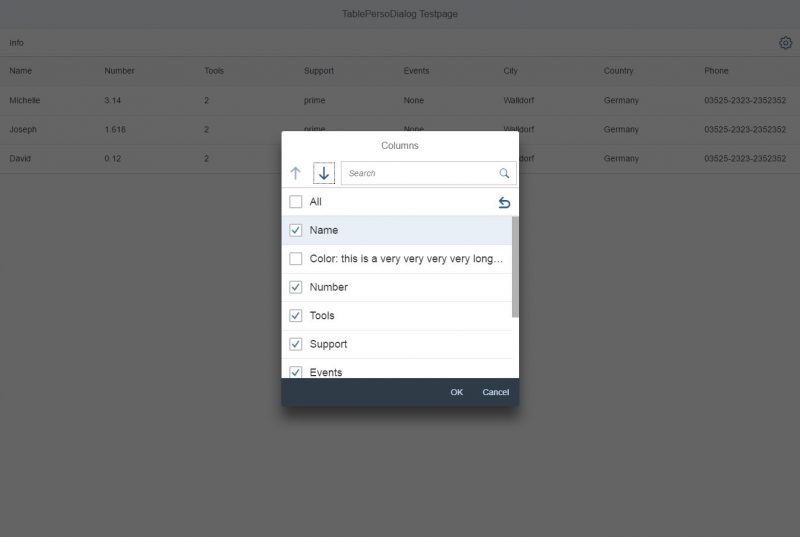
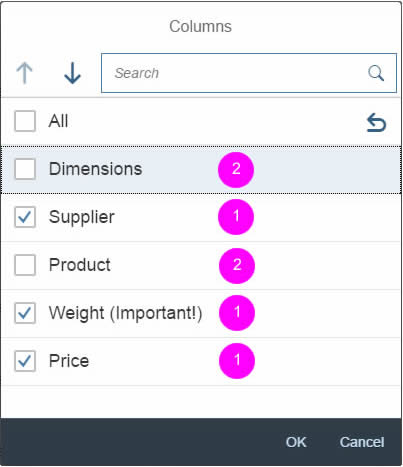
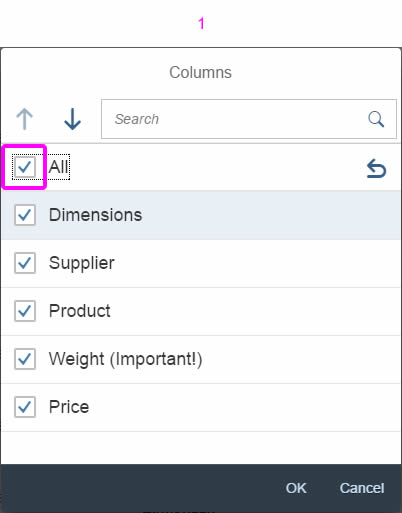
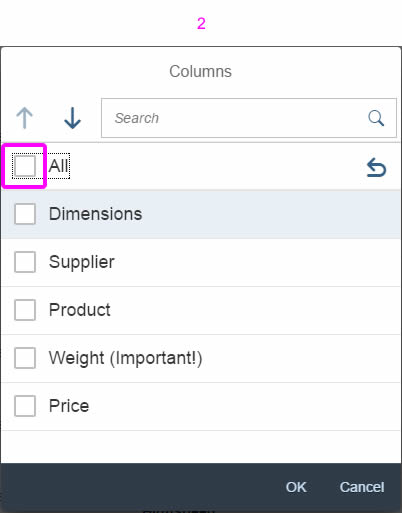
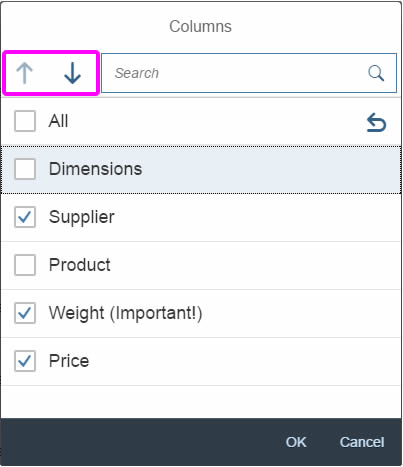
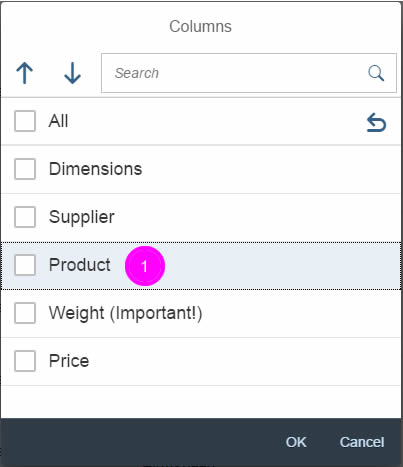
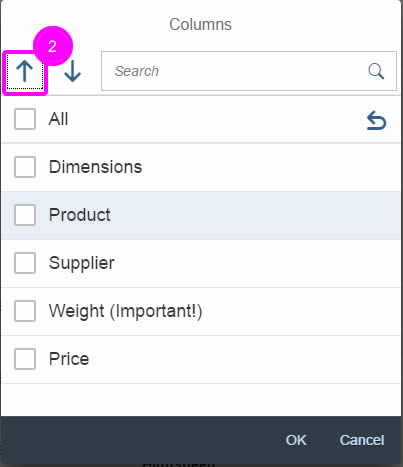
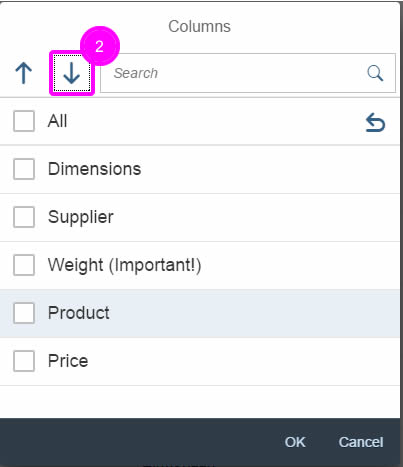
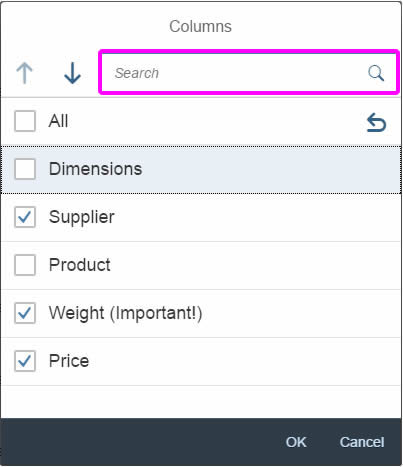
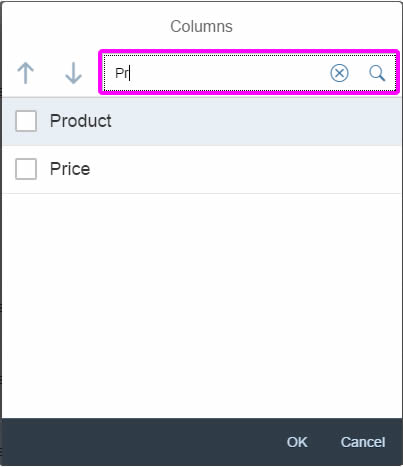
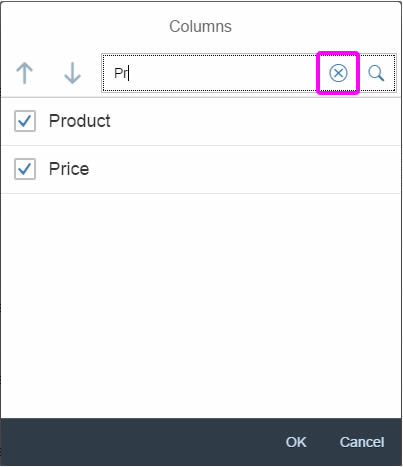
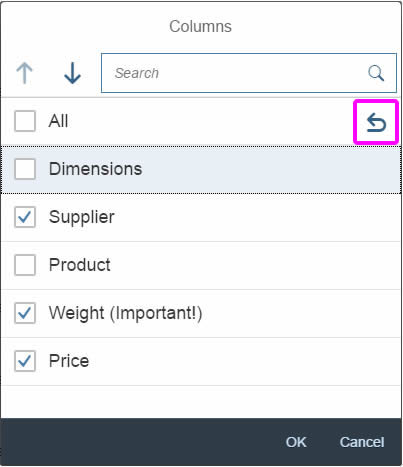
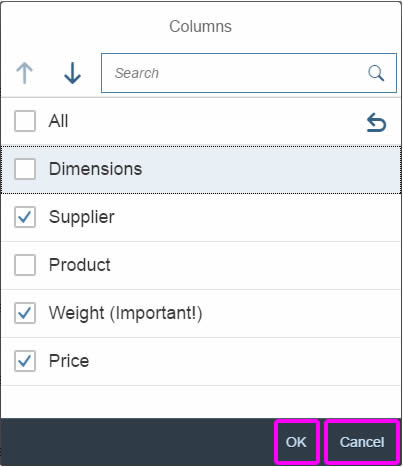
 Your feedback has been sent to the SAP Fiori design team.
Your feedback has been sent to the SAP Fiori design team.